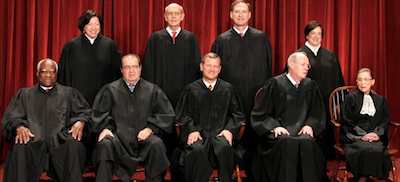By Dan Calabrese ——Bio and Archives--May 6, 2014
American Politics, News | CFP Comments | Reader Friendly | Subscribe | Email Us

The ruling was the result of a suit brought in Greece, N.Y., an upstate town that has started its monthly board meetings with a prayer since 1999. The prayer has been open to all creeds, but because nearly all local congregations are Christian, the prayers have been, too. Between 1999 and 2007, all participating ministers were Christians. Two residents — one Jewish, one atheist — who attended the meetings filed suit, alleging the prayers were an endorsement of Christianity. A lower court ruled that the prayers violated the Constitution, but the Supreme Court overruled that decision. Kennedy argued in the majority that the prayers were voluntary, and members of the public were not forced to participate. There was also no evidence, he wrote, that government decisions were influenced by a person’s participation in the prayers. And if residents heard prayers they did not endorse or believe in, he said, they should simply ignore them. The ruling comes more than three decades after the Supreme Court upheld the Nebraska Legislature’s practice of paying a Presbyterian minister to open legislative sessions with a prayer. Both houses of Congress have opened with prayers since 1789.Now let's deal with the complaint offered by the plaintiffs. They say the prayers are an endorsement of Christianity. Well yes. They are. That's what praying to Jesus is. What the Court said is that this is not a constitutional issue. The fact that a public official endorses Christianity is not a problem for the non-Christian that requires legal redress. If you hear someone pray to Jesus and you don't want to pray to Jesus, you don't have to. The public official does not forfeit his right to his own free exercise because he takes the stand in a public setting. This really gets to the silly way that a lot of people view public officials. That guy up on the stand - just because he carries the weight of an official public office - is not all-powerful. He does not have the power to impose his belief system on you by virtue of having won an election and occupying an office. He can vote for zoning laws. He can vote for budgets. He can decide where stop signs are going to. He doesn't have the power to make you a Christian if you don't want to be one. If it bothers you more that a public official prays than if some ordinary citizen does, then I'd say you have an unhealthy notion of the importance of government officials. The plaintiffs' notion that, at the very least, the selection of prayer leaders should be "rotated" among different faith systems is silly. Prayer is a waste of time unless you mean it, so a public official who is Christian does nothing meaningful by inviting an imam to lead a prayer. You might make a few people in the community feel better, but that's not the point of prayer. The point of prayer is to call down spiritual power and wisdom, and that doesn't come from a "rotation" of different notions about who or what God is. This is why what this guy wants to do is especially hilarious: “If the Supreme Court has now permitted invocations from a diverse and pluralistic range of religious and philosophical perspectives, then we must make it extremely clear that we are here and ready and willing to deliver such invocations,” said Greg M. Epstein, humanist chaplain at Harvard University. “Given over 30 percent of American young adults . . . now identify as nonreligious, I’d like to see a day when an appropriate percentage of such invocations are delivered by humanist chaplains.” Perhaps Mr. Epstein could explain who or what a humanist chaplain would be invoking. What do humanists worship? Humans? Because you don't need to pray if that's the case. The humans are all sitting right there. Just tell them to have a good meeting and be done with it. Prayer is serious business and the Supreme Court has rightly affirmed that there is no need to turn prayer into an all-for-show performance in the service of "diversity." If you mean it, pray to the God you really worship. And if someone doesn't like it, their rights are not being violated. You have a right not to worship as you choose or not to worship at all. You don't have the right not to be offended by what someone else does, and that includes public officials acting in their official capacity. And no, if I heard a public official offering a Muslin, Buddhist or Hindu "prayer," I would not feel my rights had been violated and I would not sue. I don't worship government so when government refuses to acknowledge my God, it does no harm to me.
View Comments
Dan Calabrese’s column is distributed by HermanCain.com, which can be found at HermanCain
Follow all of Dan’s work, including his series of Christian spiritual warfare novels, by liking his page on Facebook.